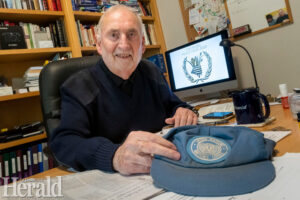Nobel Peace Prize-winning WFP continues to make a difference
By Lethbridge Herald on October 14, 2020.
 Lethbridge's Trevor Page shows a United Nations hat from his time working with the World Food Program, as the organization was awarded this year's Nobel Peace Prize. Herald photo by Ian Martens @IMartensHerald
Lethbridge's Trevor Page shows a United Nations hat from his time working with the World Food Program, as the organization was awarded this year's Nobel Peace Prize. Herald photo by Ian Martens @IMartensHeraldTim Kalinowski
Lethbridge Herald
tkalinowski@lethbridgeherald.com
The recent announcement that the United Nations World Food Programme (WFP) is the recipient of the 2020 Nobel Peace Prize is a recognition that much of the world’s hunger is directly attributable to armed conflicts raging around the world with an estimated 80 per cent of the world’s malnourished children living in conflict zones, according to the Nobel Peace Prize Committee.
In 2020 COVID-19 has only exacerbated an already tragic situation for many of those suffering malnourishment and hunger, particularly in combat zones.
The awarding of the 2020 Nobel Peace Prize to an organization like the WFP, which has a strong track record of making a difference for over 100 million people living in precarious food situations around the world, is an acknowledgement not only of this important work, but it also highlights the fact the world must do more, says former WFP employee Trevor Page, who is now retired in Lethbridge after working over 30 years for the organization as a logistics expert.
“Other (UN) agencies have been under criticism for being overblown in terms of staff, in terms of not delivering the goods,” he says. “That has not been the case with WFP. In fact, we even went the other way for a long time — our administrative overheads were the lowest in the UN system. We are the largest of the humanitarian agencies in the world with a staff of 18,700 currently, with a budget of $8 billion. We are currently reaching (with aid) about 100 million people, but the estimates of the number of hungry in the world is 700 million.”
The United Nations World Food Programme was first proposed by U.S. Senator George Mitchell and endorsed by then President Dwight D. Eisenhower and has been serving the world for over 57 years with a proven track record of “delivering the goods,” both figuratively and literally, says Page.
“I think basically the world is getting a little tired of (the world institutions’) inability to be able to resolve conflict,” he says. “It’s not just Trump that is building walls; so is Europe. And people are generally fed up with that. And then they look at WFP, and it is actually able to resolve some problems. And it does so at low cost, and we have an executive director, David Beasley, who has actually lifted WFP up in the eyes of the public. Particularly, by telling them what we are doing and why we are doing it.”
Page says the WFP has gone above and beyond its usual efforts this year to take on the COVID-19 pandemic challenge head-on.
“The WFP is a food aid agency, but what it has done with COVID, because of the disruption to the economy, to connections, to air transport in particular, WFP has become the largest (freight) airline in Africa right now,” he says. “While airlines are all grounded, WFP with about 80 aircraft are moving not just food, but all the PPE and medical supplies, around the world in collaboration with various airlines who are generally grounded. So we deliver the goods, and we have become known for that with the UN system and within donor governments.”
Page, who still sits on the international WFP alumni committee, says he and all other former and current employees are “over the moon” to be recognized for the important work they have been doing for the past six decades by the Nobel Prize Committee.
“The Nobel Prize raises our profile,” he says. “It shows not just governments, but the general public the work we do is appreciated. We are actually living in miserable times, and if you have something which is tangible, you can eat it, you don’t die of starvation. It is a relief for some we are able to hit where the need is greatest.”
Follow @TimKalHerald on Twitter
-1




